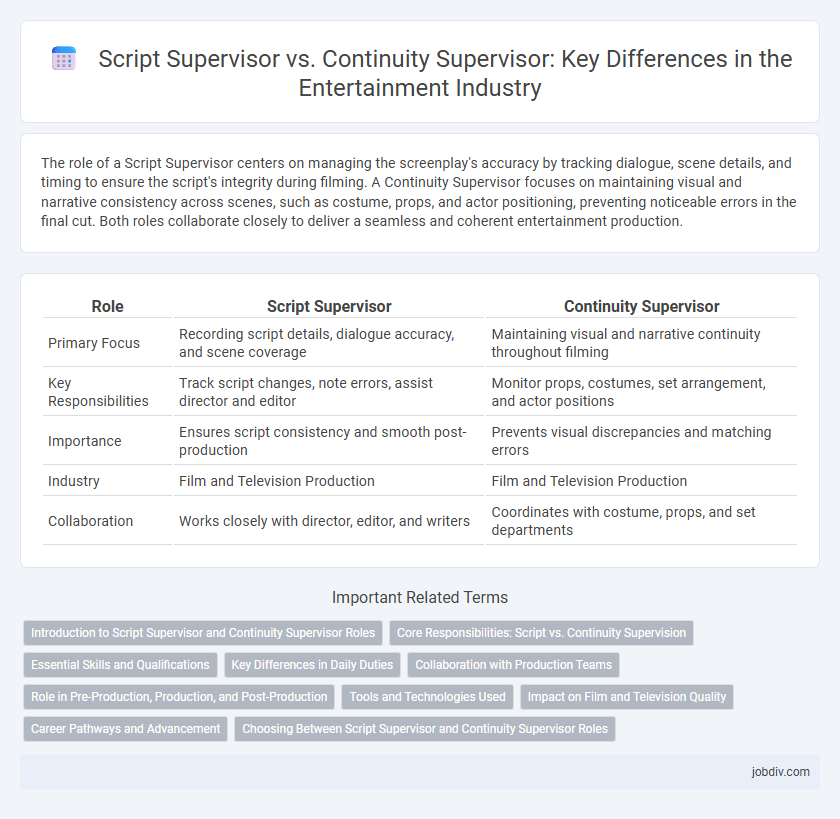The role of a Script Supervisor centers on managing the screenplay's accuracy by tracking dialogue, scene details, and timing to ensure the script's integrity during filming. A Continuity Supervisor focuses on maintaining visual and narrative consistency across scenes, such as costume, props, and actor positioning, preventing noticeable errors in the final cut. Both roles collaborate closely to deliver a seamless and coherent entertainment production.
Table of Comparison
| Role | Script Supervisor | Continuity Supervisor |
|---|---|---|
| Primary Focus | Recording script details, dialogue accuracy, and scene coverage | Maintaining visual and narrative continuity throughout filming |
| Key Responsibilities | Track script changes, note errors, assist director and editor | Monitor props, costumes, set arrangement, and actor positions |
| Importance | Ensures script consistency and smooth post-production | Prevents visual discrepancies and matching errors |
| Industry | Film and Television Production | Film and Television Production |
| Collaboration | Works closely with director, editor, and writers | Coordinates with costume, props, and set departments |
Introduction to Script Supervisor and Continuity Supervisor Roles
Script Supervisors ensure precise tracking of dialogue, action, and camera angles to maintain storytelling consistency, playing a crucial role in production records. Continuity Supervisors focus on visual and narrative coherence between shots, monitoring props, costumes, and set details to prevent discrepancies. Both roles collaborate closely to uphold seamless flow in film and television production, optimizing post-production efficiency.
Core Responsibilities: Script vs. Continuity Supervision
Script Supervisors focus on maintaining the script's integrity by tracking dialogue, scene coverage, and shot details to ensure accurate storytelling and seamless editing. Continuity Supervisors oversee visual and physical consistency, managing props, wardrobe, and set details to prevent continuity errors during filming. Both roles collaborate closely to guarantee a coherent final production that aligns with the director's vision and narrative flow.
Essential Skills and Qualifications
Script Supervisors require meticulous attention to detail, strong organizational abilities, and expertise in noting screenplay variations to ensure scene consistency. Continuity Supervisors emphasize keen observational skills and thorough knowledge of shot composition and blocking, guaranteeing visual and narrative coherence throughout production. Both roles demand proficiency in time management, communication, and familiarity with filming protocols to support seamless storytelling.
Key Differences in Daily Duties
A Script Supervisor primarily handles the accuracy of the screenplay during filming, ensuring dialogue, actions, and scene details match the script to maintain narrative flow. In contrast, a Continuity Supervisor focuses on visual consistency, tracking elements such as costumes, props, and actor positions to prevent noticeable discrepancies between shots. While both roles aim to preserve continuity, the Script Supervisor emphasizes script fidelity, and the Continuity Supervisor prioritizes visual and physical uniformity throughout production.
Collaboration with Production Teams
Script Supervisors and Continuity Supervisors work closely with directors, cinematographers, and editors to ensure scene consistency and accurate shot sequencing. Their collaboration with production teams involves meticulous tracking of script details, camera angles, and actor movements to maintain narrative coherence throughout filming. Effective communication between these roles helps prevent continuity errors, streamlining the post-production process and enhancing overall film quality.
Role in Pre-Production, Production, and Post-Production
The Script Supervisor manages shot-by-shot continuity and detailed script notes throughout pre-production, production, and post-production, ensuring all scenes align with the screenplay and director's vision. The Continuity Supervisor focuses primarily on visual and audio consistency on set during production, tracking elements like props, wardrobe, and actor placement to prevent discrepancies between shots. Both roles collaborate closely, with the Script Supervisor also aiding post-production editors by providing comprehensive script annotations and continuity reports.
Tools and Technologies Used
Script Supervisors use digital script annotation software like ScriptE and Final Draft to track dialogue, scene details, and timing, ensuring script accuracy. Continuity Supervisors employ video playback tools and specialized apps such as MovieSlate for real-time scene monitoring and matching visual elements like props and costumes. Both roles leverage high-resolution cameras and tablets to facilitate seamless communication and instant updates on set.
Impact on Film and Television Quality
Script Supervisors and Continuity Supervisors play pivotal roles in maintaining narrative coherence and visual consistency, directly impacting film and television quality. Script Supervisors meticulously track dialogue, scene timing, and character actions to ensure seamless storytelling, while Continuity Supervisors focus on preserving visual elements like props, costumes, and set details across shots. Their combined efforts minimize production errors, enhance viewer immersion, and uphold professional standards in broadcast and cinematic projects.
Career Pathways and Advancement
Script Supervisors primarily concentrate on screenplay accuracy and scene details, ensuring dialogue and actions align with the script, which often leads to roles in script editing or production management. Continuity Supervisors emphasize maintaining visual and narrative consistency across shots and scenes, creating opportunities to advance into roles such as assistant director or post-production supervisor. Both career pathways offer upward mobility through gaining specialized skills and experience in set coordination, attention to detail, and collaboration with directors and editors.
Choosing Between Script Supervisor and Continuity Supervisor Roles
Choosing between a Script Supervisor and a Continuity Supervisor depends on the specific production needs and scale. A Script Supervisor primarily focuses on tracking the script's dialogue, scenes, and shot details to ensure accuracy and consistency during filming. In contrast, a Continuity Supervisor emphasizes maintaining visual and narrative continuity, monitoring costumes, props, and actor positions to prevent discrepancies across scenes.
Script Supervisor vs Continuity Supervisor Infographic

 jobdiv.com
jobdiv.com